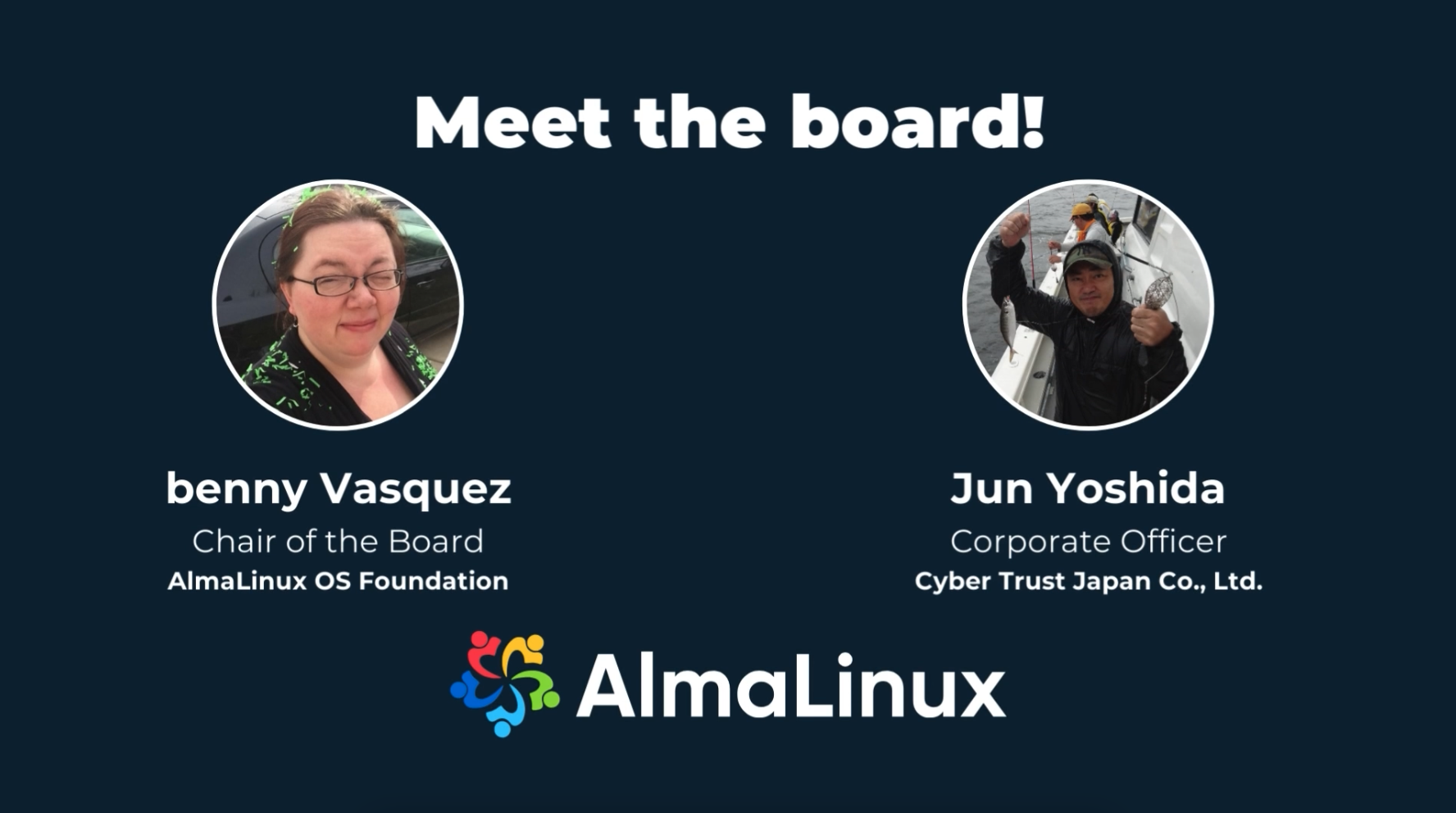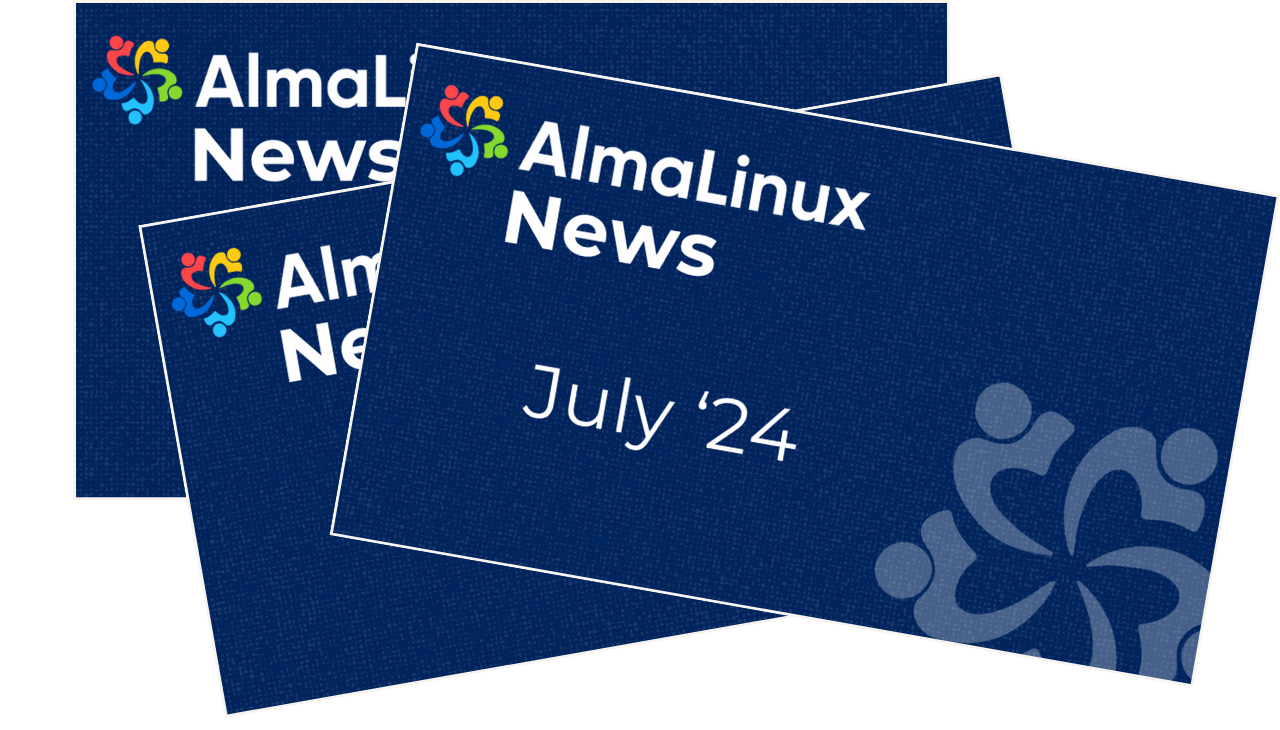
As you may be aware, last year, we launched a video series in which we have community members answer common questions we’re seeing from the community. This year, we also launched another Q&A video series, this time with the AlmaLinux OS Foundation board members. Our goal with this new board member Q&A series is to better introduce our board to the broader community.
For our latest board member Q&A video, we interviewed Jun Yoshida. Jun talks about how he got his start with IT (despite a university major that may surprise you), his history with Unix/Linux, and his hopes for AlmaLinux. Learn a bit more about Jun by watching the video, or check out the transcript below!
Learn more
The AlmaLinux OS Foundation’s board is community elected, by members of the AlmaLinux OS Foundation. If you use AlmaLinux, contribute to AlmaLinux, or support AlmaLinux in some way, we encourage you to join the foundation. Individual membership is free, because you shouldn’t have to pay to have a voice in the future of something you care about.
If you’d like to learn more about our board and elections, you can check out our Wiki! You can also watch the other videos in this series in this YouTube playlist (we’ll be adding more soon!).
See the other interviews here:
- In September, we interviewed Jack Aboutboul: Meet the board - Jack Aboutboul
We also had a panel of board members at AlmaLinux Day: Germany in 2024 where board members talked about everything from how they got involved in AlmaLinux to their feelings about the future of open source, which you can watch on YouTube Meet the board!
Transcript
Note: This transcript has been edited for clarity and readability.
benny: Thanks for joining me, Jun. I’m very excited to continue this series that we’re trying to do where we introduce board members to our community because we’re all leading this project and folks don’t necessarily know who we are or where we came from. So, why don’t we start with: what got you involved in the world of Linux and open source?
Jun: When I started to work as an IT engineer, most companies made everything by themselves. OSS was usually not included in their products. I had put myself
in such a closed world. In Japan, there is an old novel, which is called Sanshōuo. It means
Salamander. At the beginning of the story, there is a salamander living in a tiny cave that eventually grew too big to fit through the cave entrance, and it was stuck inside. So he ended
up being happy just looking out from the cave every day, without ever, ever really knowing the
outside world. I didn’t want to be like him, so I decided to join an OSS company.
benny: That’s fantastic. That’s a great story. What was the first Linux distribution you used?
Jun: In my previous job, I was involved in the development of the OODB system.
benny: Oh, okay.
Jun: Initially, we developed on the Solaris platform. When it came time for the Linux version, I used Vine Linux. However, at the time, I only used it for just operation check and testing. And I started using Linux seriously after joining Miracle Linux Corporation. And of course, the distribution I used was Miracle Linux.
benny: That’s fantastic. And that eventually led to you learning about and being part of AlmaLinux. What inspired you to run for election to the AlmaLinux board?
Jun: Okay. I have spent over 10 years of my career developing a Linux distribution called Asianux. Asianux is a Linux distribution aimed at the Asian market, and was intended for common use in Asian countries such as Japan, China, South Korea, Vietnam, Thailand, and Sri Lanka. I was dispatched to that Asianux project to work by Miracle’s cooperation. And in that activity, I was very aware of neutrality. Cybertrust Japan had joined the development of the AlmaLinux last year, but I felt that I could make a stronger contribution to the AlmaLinux Foundation using my experiences. I’d feel happy if I could continue something, I’ll contribute something to the foundation.
benny: I think you absolutely give all kinds of stuff to the foundation and your voice is very, very
helpful for us. Let’s expand it a little bit. I know that you’ve talked a little bit about your history and open source, how do you and Cybertrust in general give back to open source?
Jun: Cybertrust Japan was originally a company called the Miracle Linux Corporation. And the Miracle Linux Corporation itself has been providing a Linux distribution to the Japanese market for over 20 years. Miracle Linux is often used in mission critical systems and is not very mainstream. However, I am sure that the product we provide is useful to people living in Japan. And we also make patches when developing our products or fixing bugs which our customers encounter. And we also send those patches back stream.
benny: That’s awesome. That’s what open source is all about really is helping each other and and when big corporations or any corporations that have the ability to are giving back to the open source community in general it makes me very, very happy. What is most exciting to you about the things that AlmaLinux is doing right now? And where do you think we’re gonna go in the next five years?
Jun: One of the reasons we, Cybertrust Japan, considered joining AlmaLinux is its neutrality. As you know, the AlmaLinux Foundation has many corporate sponsors. However, the AlmaLinux Foundation and the community are not affected by them and operate with neutrality. I think it’s really amazing. I believe the goal will continue to gain the support of many excellent OSS engineers, and at the same time, open the door to new opportunities. And I have no doubt AlmaLinux will develop into a major Linux distribution.
benny: Well, I’m excited to see that come true. For sure. Let’s do a little bit more introducing you to people. What’s a little background about you? Where did you come from?
Jun: Yeah. Oh, from Japan.
benny: Yeah, yep.
Jun: So actually in university, I have not studied IT stuff.
benny: No?
Jun: No, my major was physics.
benny: Amazing.
Jun: I didn’t really study anything IT in university. I got all my IT skills through working after I graduated from university.
benny: Amazing.
Jun: Yeah.
benny: That’s fantastic. What did you want to be when you grew up? If you went to school for
physics, what did you do - what was your dream job when you were a kid?
Jun: Oh. When I was a child, I actually wanted to be a fisherman.
benny: That’s awesome.
Jun: Also a police officer or Ultraman. I wanted to be a fisherman who lives in a small boat on a small island somewhere in the south, taking only what he can eat that day. It’s like living life away from civilization. I had such a fantastic dream because I was young. I remember watching a movie called WarGames when I was in high school. I think the story was about a high school student who cracks some system and almost starts nuclear war. I remember I became a little interested in computers when I saw that movie.
benny: That was probably a motivator for a lot of people. That’s awesome. Well, thank you so much for joining me today, Jun. This is gonna be a great way for people to get to know you.

